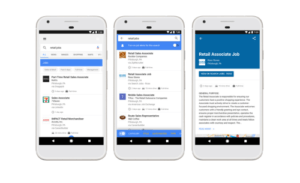Lack of awareness: why Google for Jobs works
 Before a candidate can even think about finding a new job, they have to be aware that it is there. That the employer exists. That the employer is looking for someone to do something. If a candidate is completely unaware of the job or the employer, it doesn’t matter if that person is the perfect fit for the job. Without awareness, there will be no candidate action – and without that, the employer is up a creek without their proverbial paddle.
Before a candidate can even think about finding a new job, they have to be aware that it is there. That the employer exists. That the employer is looking for someone to do something. If a candidate is completely unaware of the job or the employer, it doesn’t matter if that person is the perfect fit for the job. Without awareness, there will be no candidate action – and without that, the employer is up a creek without their proverbial paddle.
So how do job seekers – passive, active, or otherwise – become aware? Well, many ways: their own direct experience – seeing an ad in a subway or on a billboard, hearing a promo on the radio or on their favorite website; via their friends and colleagues – conversations, shared social media posts, forwarded texts or emails; via their own work life – knowing what companies are out there, or belonging to an association; and via their own attempts to find what’s out there – almost always beginning with a query in Google.
That last bit is where Google for Jobs comes in. The candidate types or speaks a query like ‘admin jobs in aerospace companies near me’. And you know what happens next in dozens of countries around the world: the blue Google for Jobs box pops up with available jobs and the ability to refine the results.
The first step of a candidate’s awareness has taken place. They have a bunch of jobs and employers right in front of them that are pretty good matches to what they asked for, plus an easy way to narrow them down. And all they did was what they do whenever they want to find a new shoe store, or a movie review, or a place to buy laptop batteries: they asked Google to find it for them.
Now you may say – correctly – that this is what any decent job board does: it builds awareness for its employers and jobs. But…no job board (even Indeed) occupies the central place in a candidate’s life that Google does. When someone wants to find out something, they turn to Google. It is an awareness-building tool that just happens to monetize its functionality via ads.
Job boards have almost always lived in the Google ecosystem. They’ve had to play by its SEO rules. They have lived (and died) by their prominence on the search results page. What the onset of Google Jobs has done is to structure job posting data and extract it into a single search results environment. You could argue that it has eroded the ability of a job site or employer career site to stand out – but you could also argue that it has improved the ability for smaller players to become visible. It’s given them a chance in the awareness game.
So what’s next in the fight for a candidate’s awareness? I suspect there will be additional refinements in how to surface particular types of jobs – Google has already done this with veterans’ and remote jobs. There will inevitably be a paid ad component included.
But remember, too, that Google is fighting its own battle to stay relevant in the user’s world. Closed environments like Facebook are battling to make Google seem irrelevant to users. Offline platforms like radio and outdoor media are making a comeback. And job ads are popping up in all sorts of non-traditional environments. The thing to remember is that the ‘how’ of creating candidate awareness is less important that the fact that you actually do whatever you need to do to capture a job seeker’s attention. If Google for Jobs does that for you, then that’s what you do. If you need to drive a signboard truck around downtown Tokyo, that’s what you do. Your job #1 is basically to make the candidate aware.
[Want to get Job Board Doctor posts via email? Subscribe here.]. [Check out the JobBoardGeek podcast archive!]
[…] voor de zoeker doen, een businessmodel moet er zijn, anders houden ze er altijd mee op. Daarom verwachten velen dat Google for Jobs in de volgende fase een betaalde versie zal uitrollen. Op die manier kun je […]